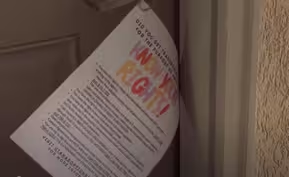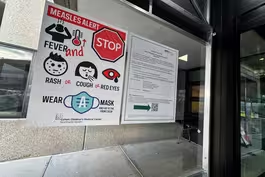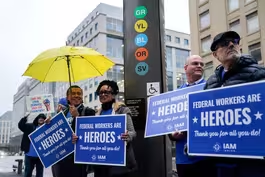
Opera uses AI to give non-verbal people a voice
Clip: 7/10/2025 | 9m 20sVideo has Closed Captions
Opera uses AI to give people with non-verbal disabilities a voice
At an Omaha, Nebraska, festival this summer, new work explores the intersection of art, disability and technology, asking questions like "who has a voice?" and "who gets to be heard?" Senior arts correspondent Jeffrey Brown reports on this unusual undertaking for our arts and culture series, CANVAS.
Problems playing video? | Closed Captioning Feedback
Problems playing video? | Closed Captioning Feedback
Major corporate funding for the PBS News Hour is provided by BDO, BNSF, Consumer Cellular, American Cruise Lines, and Raymond James. Funding for the PBS NewsHour Weekend is provided by...

Opera uses AI to give non-verbal people a voice
Clip: 7/10/2025 | 9m 20sVideo has Closed Captions
At an Omaha, Nebraska, festival this summer, new work explores the intersection of art, disability and technology, asking questions like "who has a voice?" and "who gets to be heard?" Senior arts correspondent Jeffrey Brown reports on this unusual undertaking for our arts and culture series, CANVAS.
Problems playing video? | Closed Captioning Feedback
How to Watch PBS News Hour
PBS News Hour is available to stream on pbs.org and the free PBS App, available on iPhone, Apple TV, Android TV, Android smartphones, Amazon Fire TV, Amazon Fire Tablet, Roku, Samsung Smart TV, and Vizio.
Providing Support for PBS.org
Learn Moreabout PBS online sponsorshipAMNA NAWAZ: At an Omaha, Nebraska festival this summer, new work explores the intersection of art, disability, and technology, asking questions like, who has a voice and who gets to be heard?
Senior arts correspondent Jeffrey Brown reports on this unusual undertaking for our arts and culture series, Canvas.
(SINGING) JEFFREY BROWN: A mother sings to her disabled son of her love and hopes for him, but there is danger threatening.
(SINGING) JEFFREY BROWN: And, together, they decide to flee.
We're in a dystopian future world, though perhaps not so very different from our own, in which artificial intelligence is being used to create what?
Some new kind of life.
The opera titled "Sensorium Ex" is both art and advocacy, aimed at giving new voice and opportunities to the disabled, using A.I.
to benefit, rather than harm, and changing the world of opera itself.
Composer Paola Prestini: PAOLA PRESTINI, Composer, "Sensorium Ex": I'm very interested in how art can open up new avenues, and that's what I felt like "Sensorium" did.
JEFFREY BROWN: In this case new avenues to?
PAOLA PRESTINI: To listen more deeply and to create more welcoming spaces for folks who express themselves differently and who have different disabilities.
BRENDA SHAUGHNESSY, Librettist, "Sensorium Ex": Say Paola.
JEFFREY BROWN: Prestini's collaborator, poet Brenda Shaughnessy, wrote the libretto and grounded it in her lived experience as the mother of a disabled child.
BRENDA SHAUGHNESSY: What do you hear?
JEFFREY BROWN: Her son, Cal, now age 18, seen here at 12 listening to music by Prestini played by her husband cellist Jeffrey Zeigler.
Shaughnessy, who'd never written for an opera before, says this work was deeply personal and often painful, but, for her, necessary.
BRENDA SHAUGHNESSY: Nonverbal, nonambulatory.
Kids like him don't get to be part of anything.
In a way, I wrote him into the opera because I wanted him to get to be part of the mix, get to be -- get to do something, get to be the hero of a story, get to be -- be heard.
JEFFREY BROWN: And that became the essence of this project, who has a voice and who is heard.
Prestini and Shaughnessy were determined to make the answer everyone by creating a work for a cast and crew that included some with disabilities such as cerebral palsy, autism, and blindness, writing and composing a story of a mother called Mem, sung by Hailey McAvoy, and her disabled son named Kitsune.
BRENDA SHAUGHNESSY: Kitsune's voice is central to the opera.
You can't -- it can't be sidelined.
It's in the score.
It's the music.
It's in the tech.
It's in the plot.
JEFFREY BROWN: But if opera is all about the voice, how to write for those thought to have none?
PAOLA PRESTINI: It's like writing for a person who you love, but the instrument doesn't exist yet.
And so the challenge that we had was, well, how do we amplify the voice that this person does have?
Because there are nonverbal ways in which you communicate.
And then how do we find, if you will, a deeper expression to the communication device that this actor would use?
JEFFREY BROWN: One of the two actors playing Kitsune, 23-year-old Jakob Jordan, who is himself nonverbal, but has a new way of communicating.
JAKOB JORDAN, Actor (through A.I.
voice): For the first 22 years of my life, I felt like a witness to a crime that would happen over and over again.
My thoughts were being held hostage inside my head while the wrong words were impersonating me, tricking everyone to believe I was much simpler than I am.
JEFFREY BROWN: Jakob was diagnosed as a toddler with autism and apraxia, a neurological condition in which his body and speech don't respond to the signals sent from his brain.
Here's how he puts it, along with a bit of his characteristic sense of humor.
JAKOB JORDAN (through A.I.
voice): Basically, my body does not listen to the commands I give it.
I may want to ask my friend if he saw that cute girl walk by, but my speaking voice gets stuck in loops, talking about airports or dumb songs and a small variety of other repetitive topics.
It also affects my whole body.
JEFFREY BROWN: Only in the last two years came a breakthrough, when he learned to type words with a trained communication partner.
When he finishes his sentence, it comes out in an electronic voice.
JAKOB JORDAN (through electronic voice): I caught the acting bug.
JEFFREY BROWN: But in our interview, for which we sent questions ahead of time so he could consider and type responses, we heard more of Jakob's actual voice.
JAKOB JORDAN (through A.I.
voice): Nothing compares to getting to express myself purposefully with the voice I was born with.
JEFFREY BROWN: Brought to life through Sensorium A.I., a partnership between the opera's creative team and NYU's Ability Project, a research lab in Brooklyn, New York, dedicated to the intersection of disability and technology.
Luke DuBois is an NYU professor, engineer and researcher and himself a composer and musician.
He first recorded the sounds Jakob can and does make.
R. LUKE DUBOIS, NYU Professor: So we have got recordings of Jakob just doing his thing.
JAKOB JORDAN: (INAUDIBLE) R. LUKE DUBOIS: Right?
So he's very expressive.
Some of it is whistles.
Some of it is singing.
Some of it is speech like that.
And what the system does is, it takes that recording and infers from it the physical body that made it.
JEFFREY BROWN: Infers... R. LUKE DUBOIS: Yes.
JEFFREY BROWN: ... means you're creating his -- sense of his body and therefore sense of his voice.
R. LUKE DUBOIS: Exactly.
And so what I can do is, I can take a phrase like, "I would like to go sailing tomorrow," have it cranked through.
And then what you would end up with is, you would end up with a recording.
JAKOB JORDAN (through A.I.
voice): I would like to go sailing tomorrow.
R. LUKE DUBOIS: Right?
And it sounds like Jakob.
JEFFREY BROWN: DuBois and the team use sensors that allow Jakob to control his speech... JAKOB JORDAN (through A.I.
voice): I would like to go sailing tomorrow.
JEFFREY BROWN: ... and, depending on how he moves his hand, give it a kind of expressiveness of pitch and pace.
JAKOB JORDAN (through A.I.
voice): I was never lost.
JEFFREY BROWN: Amazing stuff.
And it was created specially for and incorporated into the opera, making this a story about the potential evils of A.I., while using its benefits.
And this is open-source technology, publicly available for anyone to take to the next step.
R. LUKE DUBOIS: I want this in the hands of everyone who needs it.
I have been talking to all sorts of speech researchers all over the country in the last couple years.
And they're all looking at really interesting different angles on this thing.
So it's going to be cool, man.
It's going to be cool what happens next.
JEFFREY BROWN: Composer Paola Prestini hopes her work will receive more productions and, offering a blueprint for the future, give new opportunities to those with disabilities wanting to be part of her art form.
PAOLA PRESTINI: Create the system and understanding that, yes, it's a challenge, but these are the ways.
And you just do it one step at a time and you get there.
All of a sudden, you get the complexity of human life represented on stage.
And that's why we do what we do.
It's not just a mirror to society.
It's also a pathway to a better way.
JEFFREY BROWN: And poet and librettist Brenda Shaughnessy sees the opera and its technology opening avenues for many, including her son.
BRENDA SHAUGHNESSY: It's not enough, in my opinion, for Cal to just sort of sit there on the sidelines not getting to participate in anything.
It's not enough for anybody to just sort of be there disconnected.
What I want is for a kid, a disabled kid, a nonverbal kid, to see this and suddenly say, not just, oh, I could be in an opera, I could maybe be an actor, maybe I could play Kitsune one day.
But I also want that kid to say, there I am.
I exist.
JAKOB JORDAN (through electronic voice): (INAUDIBLE) JEFFREY BROWN: It took Jakob Jordan about a minute to type his answer when I asked what it was like to perform on stage in Omaha earlier this summer.
His answer was worth any wait.
JAKOB JORDAN (through electronic voice): It was the most fulfilling experience of m y life.
(CHEERING) JEFFREY BROWN: For the "PBS News Hour," I'm Jeffrey Brown in Brooklyn, New York.
Agencies accused of rushing adoptions before moms backed out
Video has Closed Captions
Clip: 7/10/2025 | 8m 55s | Agencies accused of rushing adoptions before mothers can change their minds (8m 55s)
Jan. 6 prosecutor says pardons send 'dangerous message'
Video has Closed Captions
Clip: 7/10/2025 | 7m 42s | LAW & JUSTICE (7m 42s)
Measles cases surge to highest levels in over 30 years
Video has Closed Captions
Clip: 7/10/2025 | 5m 39s | Measles cases surge to highest levels in over 30 years, CDC data shows (5m 39s)
News Wrap: Judge blocks order to end birthright citizenship
Video has Closed Captions
Clip: 7/10/2025 | 7m 10s | News Wrap: Federal judge blocks Trump order to end birthright citizenship (7m 10s)
Union says fight continues against federal employee firings
Video has Closed Captions
Clip: 7/10/2025 | 7m 1s | Federal workers union says it will continue to fight firings after Supreme Court ruling (7m 1s)
Why plans for a warning system fell apart in Kerr County
Video has Closed Captions
Clip: 7/10/2025 | 6m 12s | Plans for a flood warning system fell apart in Kerr County, leaving it vulnerable (6m 12s)
Providing Support for PBS.org
Learn Moreabout PBS online sponsorshipSupport for PBS provided by:
Major corporate funding for the PBS News Hour is provided by BDO, BNSF, Consumer Cellular, American Cruise Lines, and Raymond James. Funding for the PBS NewsHour Weekend is provided by...

















